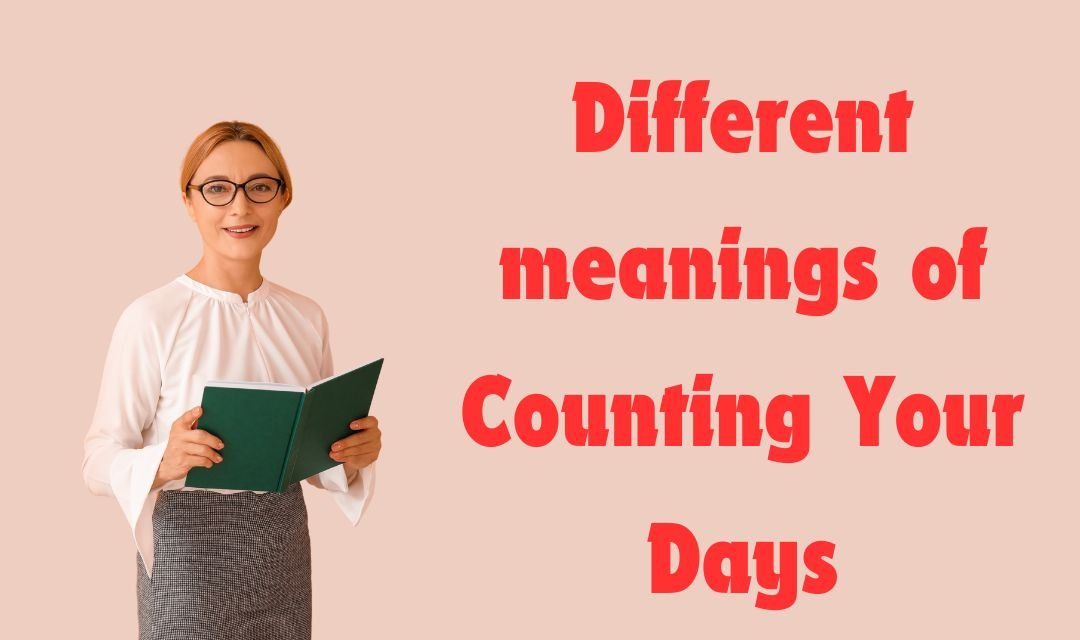Counting Your Days is a common expression that originated from the concept of being aware of the limited amount of time we have in life. This phrase serves as a reminder to appreciate every moment and live with purpose and intention. By counting our days, we are encouraged to prioritize what truly matters and seize opportunities without delay.
This idea, though challenging to pinpoint in its exact origin, can be traced back to ancient wisdom and philosophical teachings across universal cultures and philosophies. The importance of valuing the fleeting nature of our existence has been a recurring theme, reminding us to be mindful and motivate ourselves to make the most of our days. From personal experience, adopting this mindset has profoundly shifted how I approach each day, making me more focused and intentional in my actions and relationships.
Social Impression of Counting Your Days
The expression “Counting my days” often carries a profound yet somber acknowledgment of life’s finite nature, which can alter social interactions and impressions. To some, it may sound like a serious, even upsetting admission of aging or the inevitability of death, especially in contexts like terminal illness or a major life transition. However, this reflection can also inspire a more motivational and uplifting tone in conversations, similar to asking, “how is your day going?”—pushing individuals to seize the moment and chase their dreams without waiting for the “perfect moment.”
Adopting this mindset not only highlights the temporary nature of our existence but encourages a clarity and intention that can heal fractured relationships and enhance connections. It’s a motivation to appreciate life and the opportunities we often procrastinate on. Through personal reflection and shared experiences, this vulnerability can lead to deeper, more meaningful conversations about what counts in life, fostering thankfulness, love, and appreciation for the moments and people we treasure. This dual-natured approach—both reflective and contemplative—makes the concept of counting your days a powerful reminder to live life to the fullest, embracing both its preciousness and impermanence
35 points about Counting Your Days
- Counting your days is a phrase that refers to being aware of the passing time and the finite nature of life.
- It suggests paying attention to how one spends their time, making the most of each day.
- This practice can serve as a reminder to prioritize what truly matters, emphasizing the importance of being mindful and intentional.
- Counting your days encourages individuals to reflect on their goals, values, and priorities.
- It can motivate people to seize opportunities, take risks, and pursue their passions.
- This mindset prompts individuals to consider the legacy they want to leave behind.
- The concept underscores the idea of “carpe diem” or “seize the day,” making every moment count.
- It serves as a reminder not to take the present for granted and to inspire gratitude for the gift of life.
- Recognizing the opportunities each day presents can lead to living with purpose and meaning.
- Aligning actions with personal values helps create a sense of urgency in achieving personal and professional goals.
- Counting your days helps cherish relationships and the moments spent with loved ones.
- It fosters accountability for how time is allocated and invested.
- Individuals learn to evaluate how they are using their energy, which can lead to greater appreciation for the beauty and wonder of the world.
- There’s an empowerment in taking control of choices, allowing one to let go of the trivial and focus on what is authentically in alignment with their true self.
- Counting your days highlights the fleeting importance of making meaningful contributions.
- It sets out steps for a fulfilling, purpose-driven life.
- The practice of mindfulness and presence in the current moment allows one to reflect on past experiences and learn from them.
- It brings into focus the inevitability of mortality and the need to make the most of our time.
- This awareness can inspire individuals toward pursuing their dreams and aspirations.
- Appreciating the impermanence of life enhances the value of each moment.
- Achieving fulfillment and satisfaction comes from intention and making conscious choices that align with one’s goals.
- Counting your days promotes a meaningful and purposeful approach to life.
- It focuses on what’s essential, stripping away the unnecessary and enhancing life’s quality.
- The practice encourages a lifestyle where daily actions are more than routine but are steps toward greater goals.
- It can motivate one to stop procrastinating and start living more fully.
- This mindset can help people overcome fear and uncertainty by focusing on what they can control.
- It encourages the formation of habits that support sustainable living and well-being.
- Counting your days can be a powerful tool for personal growth and self-improvement.
- It teaches the importance of being patient with oneself and others as we all strive to better our lives.
- By being aware of the limited time, one can choose to live in a way that reduces regrets and maximizes happiness.
- It promotes balance between work and personal life, acknowledging that both are essential to a fulfilling life.
- Counting your days helps cultivate a resilient mindset, preparing one for life’s inevitable challenges and changes.
- It can inspire a community or group, fostering a collective understanding and support for shared goals and experiences.
- This awareness helps build a bridge between generations, as it teaches the value of wisdom, experience, and legacy.
- Ultimately, counting your days makes life richer and more vibrant, ensuring that each day is lived with intention and purpose.
Different meanings of Counting Your Days
The phrase “counting your days” can convey different meanings depending on the context in which it is used. Often, it might indicate that someone’s days are limited, typically referring to imminent death or the end of life, especially if seriously ill; here, the words “your days are numbered” imply there isn’t much time left to live. This interpretation acts as a warning or even a threat, suggesting that time is running out.
However, beyond this somber usage, counting your days can also suggest a limited amount of opportunity to complete a task, thus highlighting the urgency and importance to act quickly. In scenarios like retirement, lifestyle changes, or facing significant challenges or transitions, the term takes on a motivational tone, urging a change or transformation before circumstances are drastically disrupted. Whether as a warning, a threat, or an opportunity, the phrase nudges one to recognize the potential consequences of current actions or the need for engaging in a shift towards something new or inevitable. It’s much like looking forward to seeing you take that next bold step before time runs out.
How to use Counting Your Days in a sentence?
Literal Meaning
Counting your days can simply refer to tracking the passage of time in a straightforward sense. This could be keeping a track of days until a birthday celebration, marking each day leading up to a summer vacation in the mountains, or the days remaining until a band concert. It’s about monitoring the progress towards enjoyable events or significant milestones like a semester ending, a lease expiring, or a movie premiere you’re excited about.
Warning or Threat
In another sense, counting your days might serve as a warning or threat in scenarios where time is critical. This could be used by a partner in a long-distance relationship indicating that the patience for being apart is running out, or by someone in recovery as a motivator to remain sober by counting each day as a step towards a longer-term goal of health and wellbeing. It highlights the accountability and the high stakes associated with certain life decisions.
Limited Time or Opportunity
This phrase also emphasizes a limited time or opportunity to achieve specific goals. For instance, saving money for a world travel plan before a financial year ends, or maximizing efforts in studying for exams over a few weeks. It acts as a motivator to maintain consistent practice in areas like exercise, meditation, or developing skills on a musical instrument. The ticking clock is a reminder to stay productive and use time wisely.
Change or Transformation
Finally, counting your days can signal change or transformation, encouraging a shift in lifestyle or habits. This could be preparing for retirement, setting up a new life in a different city, or embarking on a period of volunteering for personal fulfillment. It represents a positive outlook and gratitude for new beginnings, urging people to embrace purpose and new opportunities for growth and experience. In essence, it’s like saying, “let’s blow this popsicle stand” and move on to something exciting and meaningful.
You might enjoy this post: Copys or Copies
How to use Counting Your Days in a sentence?
- I’ve been counting my days until my birthday celebration to make sure it’s a memorable event.
- Only a few more days left until our summer vacation begins, and we’ve been counting down excitedly.
- As the release of that new movie approaches, we’re counting down the days to see it on opening night.
- The kids have been counting the days until the band concert, practicing daily to ensure they perform well.
- We’ve been counting the days until our vacation in the mountains, planning hiking and sightseeing activities.
- She’s counting the days until the end of the semester so she can enjoy a much-needed break.
- The start of summer vacation is almost here, and I’ve been counting the days to our beach getaway.
- With the release of that new movie next week, I’m counting down the days to watch it with friends.
- I’m counting the days until my favorite band’s concert; it’s going to be an epic night!
- After announcing his retirement, he’s been counting the days to a relaxed and leisurely lifestyle.
- Counting the days until I can retire and travel the world has been my motivation at work lately.
- Counting the days until I see my long-distance partner again keeps my spirits high.
- Counting the days of sobriety helps in maintaining a strong focus on recovery.
- Counting the days since I started my exercise regimen helps me track progress and stay accountable.
- My daily meditation has become a consistent practice; I’m counting the days to mark a full year.
- Counting the days of productivity at work helps keep everyone on track and accountable.
- Counting the days until my exams begin helps me to stay focused and study efficiently.
- We’ve been counting the days of saving money to reach our financial goals and buy our first home.
- She’s been counting the days until her lease expires to move to a better neighborhood.
- Counting the days of practicing my guitar has greatly improved my skills.
- Counting the days until my vacation in the mountains is a great way to fuel my excitement.
- I’ve been counting the days until I start my volunteering project, looking forward to the fulfillment and purpose it brings.
- As he nears retirement, he’s counting the days to a new chapter of life, planning to travel the world.
Making Questions with Counting Your Days
- How many days are you counting down until your next special event or occasion?
- What strategies do you use to effectively stay motivated while counting days to a vacation?
- How do you feel when you realize the deadline for a big work project is fast approaching?
- When counting days for school exams, what helps you stay focused and motivated?
- Are you counting days until a family reunion after a long time apart?
- What does the next chapter of your life look like as you start counting days to retirement?
- How do you handle the impatience when counting days to a holiday celebration?
- When is your next medical appointment or procedure, and how are you preparing as the days decrease?
- How does it feel to approach the end of a difficult period or situation?
- What will you do to celebrate when you reach a significant milestone in your life?
- How do you decide when it’s the right time for a major life decision or change?
- Are you counting days until the new season of your favorite TV show starts?
- How do you stay motivated through challenging times when counting days until an achievement or accomplishment?
· What are your favorite methods for counting days until an important event or occasion?
- How does counting days influence your preparation for a vacation or a holiday?
- Can you share how counting days to a deadline helps you manage work stress?
- What strategies do you find most effective for keeping track of time until a school project or exam?
- How do you celebrate after counting days to a major life milestone like graduation or a promotion?
- Does counting days help you stay motivated during the anticipation of a medical procedure?
- What life decision prompted you to start counting days, and how did you manage the wait?
- How do you cope with impatience or anxiety when counting days to the end of a difficult period or challenging situation?
- What does counting days reveal about your outlook on upcoming life changes, such as retirement or moving to a new city?
- Are you counting days for any upcoming TV show premieres or season finales that have you excited?
You might enjoy reading: Top 120 Verbs That Start With R
Here Are a Few Idioms Related to Counting Your Days:
· Counting the days: Refers to eagerly awaiting an upcoming event by marking time until it occurs.
- Example: I’ve been counting the days until our family vacation; it’s just two weeks away!
· Days are numbered: Used to indicate that something’s existence or relevance is limited and finite.
- Example: The days are numbered for that old bookstore that’s closing down due to the digital era.
· Running out of time: Suggests that there is very little time remaining to complete an activity or achieve a goal.
- Example: We are running out of time to finish the project; the deadline is approaching quickly.
· Living on borrowed time: Implies that someone continues to survive past an expected or predicted point, often after a near-fatal accident or serious health issue.
- Example: After his near-fatal accident, he’s been living on borrowed time.
· Time is running out: Indicates that there is very little time left to act, often used when a critical deadline or end of a period is near.
- Example: Time is running out to improve our company’s financial performance this quarter.
· The clock is ticking: Emphasizes the urgency of a situation where time is limited and action needs to be taken soon.
- Example: The clock is ticking on our chance to submit the proposal; we need to act fast.
· On borrowed time: Implies that one is continuing beyond the expected time, often used in contexts where sustainability or continuation is doubtful.
- Example: The startup has been operating on borrowed time since the investors signaled they might pull out.
· Watching the clock: Refers to the act of anxiously awaiting the end of a period of time, often related to tedious or unpleasant tasks.
- Example: He was just watching the clock during the last days before his retirement, unable to focus on work.
· Beat the clock: Describes efforts to finish something before a set time expires, typically involving a race against time.
- Example: We managed to beat the clock and get all signatures needed before the contract deadline expired.
· Against the clock: Working rapidly because there is very little time left to complete a task.
- Example: The team is working against the clock to resolve the issues before the product launch.
Common Questions about Counting Your Days
Q1: What does it mean to be “counting days”?
A1: Counting days typically refers to tracking the time remaining until a specific event or deadline. People might count days leading up to a vacation, the end of a work project, or the closing of an old bookstore. It emphasizes awareness of the finite nature of certain periods or opportunities.
Q2: Why do people say “your days are numbered”?
A2: The phrase “your days are numbered” is often used to imply that the time left for a particular situation or existence is limited and running out. It can relate to everything from the end of a company’s financial period to more personal scenarios like living after a near-fatal accident. This can serve as a stark reminder that certain phases or conditions are approaching their conclusion, urging individuals to act or reflect accordingly.
Q3: How can counting days affect one’s mindset during challenging times?
A3: During tough periods, like surviving an expected downturn or running against a tight deadline, counting days can create a sense of urgency and motivation. It helps to quickly focus efforts and resources, enhancing performance under pressure and providing a measurable framework to gauge progress and survival chances.
Q4: Is there a positive aspect to counting days?
A4: Absolutely, counting days can also be an eagerly anticipated activity that builds excitement and anticipation for future events like holidays or personal milestones. It encourages individuals to prepare and savor the buildup, enriching the experience when it finally arrives.
Conclusion
Counting your days is a phrase that may seem simple, but it carries profound layers of meaning and significance. At its core, it serves as a reminder of the finite nature of time, pushing us to seize every moment and make the most of our daily routine. This awareness can be both motivating and sobering, driving us to prioritize what truly matters: our relation





